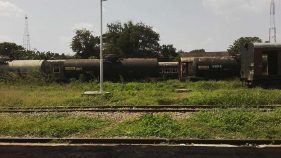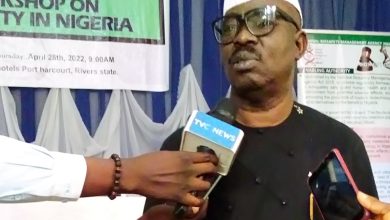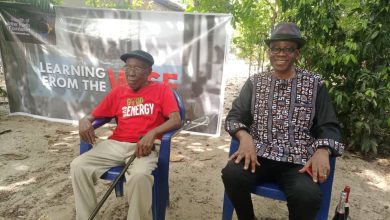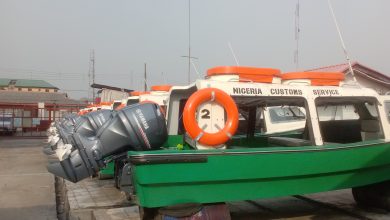South East, South South rail network in death throes
•Lack Of Rail Services Affecting Zones’ Economies – Eze
• Reconstruction Of P/Harcourt-Maiduguri Line Would Rejuvenate Eastern Zone -NRC
•Port Harcourt–Maiduguri Rail Line A Political Promise Aimed At Shifting Peoples Attention – Chibuzor
Since coming on board, the All Progressives Congress (APC)-led government has been completing some key railway projects initiated by the administration of President Goodluck Jonathan across the country, just as it has initiated new ones.
As part of the Buhari-led administration’s railway modernisation initiative, the existing narrow gauge system is gradually giving way to the wider standard gauge system that allows high-speed train operations on the railway network. This has been boosted by an ambitious acquisition of new coaches and locomotives to service new and existing rail routes in different parts of the country, including the 186.5 kilometre Abuja-Kaduna rail corridor, and the 157 kilometre Lagos-Ibadan standard gauge rail lines.
In January this year, the Federal Government acquired 44 units of coaches and locomotives comprising of 29 standard, 15 executive, and 16 diesel multiple units (DMUs).
The award of contract for the $8.3bn Lagos-Kano standard gauge modernisation project (SGRMP) to China Civil and Engineering Construction Company (CCECC), in 2006, signaled the takeoff of the initiative. The Abuja-Kaduna rail line is one of the SGRMP to be undertaken in the country, and it connects Abuja with Kaduna, facilitating the movement of goods and people between the two cities. It is also the first to be implemented as part of the Lagos-Kano standard gauge project.
But while these and other rail projects are going on in other zones, many residents of South East and South South are questioning why they are not also benefitting from the modernisation project.
For instance, they are particularly asking what has stopped the government from rehabilitating the railway line from Port Harcourt to Makurdi, which stopped operations five years ago after existing for decades. At some point, the government made N2m per trip in a train of eight coaches from Port Harcourt to Enugu.
The absence of rail services in the South East and South South, Mr. Henry Chibuzo, an investor said has adversely affected the economy of the areas
“Let me start by saying that the entire infrastructure on the eastern part of the country has been abandoned by the Federal Government. The late Gen Sani Abacha was the only person who made a serious attempt to revitalise infrastructure in the East. President Goodluck Jonathan, also made strong imprints on this, even though his attempts were not allowed to materialise. Beyond these two, we have witnessed government-after-government paying lip service to infrastructure development within the eastern flank.
“By eastern flank, I mean from Enugu, Aba down to Postikum, Mobi, Yola, Benue, Taraba, and to our borders with Cameroun. We have exploited our borders with Chad, Benin, but we have failed to exploit our borders with Cameroon up to the bank of Chad. The huge potential from Lake Chad, which flows down to Benue River have not been tapped and in any case, if they are tapped, they have not been processed or utilised. As it stands today, the poor farmer in Potiskum cannot evacuate his goods from there to Port Harcourt, and cannot do so with a ship going to Europe unlike her contemporary who is somewhere in Katsina, Kano, Kebbi, and possibly in Kwara, Ibadan, who could have access to waterways. It makes this part of the country highly dependent on other parts of the country and simply transfers wealth to that side of the country.
“That is why you see the people from that side of the country have greater opportunities than we do, and also stirs the need to urgently address this inequality. The people of the South East may assume that it is a South East issue, but I look beyond that. Unlike the days of my father and grandfather, we had reasons to move cattle from Potiskum, from Nguru, in Yobe State to Enugu, and from there we could do onward transfer to Anambra, Nnewi and other places. Today, it is no longer so,” he said.
Chibuzo continued: “ I deal with crude sales; the business has been seriously challenged because the logistics are more expensive when you do it by road. I had a contract that was terminated at a time because rail lines were not there, as the coaches were withdrawn and for many years now, we have not had coaches moving down to Enugu. The petroleum products that were supposed to move from Calabar up to the North could not move because the rail lines are not functional. The Federal Government has failed in the standardisation of rail lines from the South up to Maiduguri. We have heard a lot that has been achieved up North as far as standardisation of rail lines is concerned, but we have not seen it being actualised in the South. But if we need to enhance our economy, we have to make the rail services work, and work better.”
The entrepreneur maintained that because of the present scenario, the entire South East, South South, and the Middle Belt that fall within this line have been seriously affected. The exchange of goods has a way of enhancing the incomes of people that are engaged in it, and when these exchanges are hindered, incomes and the cost of products are affected.
“For instance, if you have to go by rail, the cost of moving one cattle from Nguru, to Enugu or Port Harcourt is high, but if you have to move such by road, you have to pay through your nose. Most of the food consumed in the South East and South South comes from the North East, and North Central, and today, we depend solely on the road to have them moved to these locations. Definitely with the disturbances on the road, and extortions being witnessed here and there, the cost of shipping them is transferred to the end-user. We have a uniform minimum wage in the country, and so the earnings of the people in this part of the country are not as challenged as those of other parts of the country. So definitely, we have a way of paying more for less, than citizens in other parts of the country, and this can be addressed if rail infrastructure is operational,” the investor explained.
Eastern Rail Line …Huge Business Hub In Death Throes
THE Eastern District of the Nigeria Railway Corporation (NRC), which traverses Ebonyi, Rivers, Abia, and Imo states with headquarters in Enugu State, is in a sorry state.
While the locomotives and coaches are weather-beaten and aged, its rail tracks are either constantly vandalised by hoodlums, or washed away by torrential rainfall, making it difficult to operate the few rickety engines that are still gasping for life. Consequently, the district, which used to be a beehive of activities has become a dead zone.
A visit to the District Headquarters of the NRC in Enugu confirmed the level of rot and decay that has enveloped it over the years. Not only have workshops been vandalised, disused, old coaches that litter the surroundings, compete for space with wild shrubs and grasses.
Now, a district that was once famous, and in competition with districts like Lagos in terms of high revenue generation not only limps but clings to life support. Indeed, the last time that it took delivery of locomotives and coaches, The Guardian gathered, was during the tenure of the late President Umaru Musa Yar’Adua, and his successor, former President Goodluck Jonathan. Of the locomotives received then, only two are still operational at the moment.
While the ticketing point at the Enugu station is deserted and cordoned off, the station’s loading point, and waiting bay are also overgrown with weeds. The entire place reeks and has been like that since the trains stopped operating.
A section of the ticketing hall now hosts a pub, operated by a woman, while the surroundings that hitherto served as car park now host a battery of kiosks. Equally converted for other uses is the ticketing area, which activities like age-grade meetings among others take place at weekends.
Apart from the ugly story of the ticketing area, the overhead and underground cables at the workshops have been vandalised over time, while other tools have been carted away.
The railways operated two training centres in Enugu. One of the buildings is located at the Holy Ghost axis on Ogui Road, and the other at the Oloko gate, still on Ogui Road. Presently, however, the buildings are either leased for other purposes or occupied by persons who have converted them to private use. The training school is gone.
Government Not Sincere With Revamping Rail Network In The South
“THE Pearl of the East,” is an inscription that welcomes any visitor to the railway station in Enugu. And Mr. Chukwudi Ugwu, a resident of Enugu told The Guardian that the acronym was given because, “with the trains, you could reach every corner of the East at an affordable rate.
“The people here are travelers and good businessmen; they liked doing so with the train because it was convenient to just pick up your goods and move, no matter the quantity, and the fare was equally reasonable. It was what held our economy, and we were moving from here to different places in the North to buy and sell. Those from the North were bringing their products into this place, including cattle. Today, the situation is not like that,” he stated.
Uzochukwu Eze, a businessman, while also lamenting the hardship that the South East economy has faced since the trains stopped working, noted that it was made worse by the plethora of bad roads in the zone, insisting that it was part of the marginalisation Ndigbo faced in the country.
Eze said: “The Buhari administration has been reconstructing rail lines in the country and providing modern coaches and locomotive engines to other parts of the country. Places that ordinarily had narrow gauge lines have been converted to standard gauge lines, but nothing is happening in the East. The development is affecting the growth of the economy here because conveying goods and materials by road is quite expensive. We can address some of these challenges by putting the tracks in order. Importantly, lives lost due to road carnage would be saved,” he stated.
A few years ago, a delegation of Ndigbo met with the Federal Government and requested the rehabilitation of the rail lines among other projects in the zone.
Chief Goddy Uwazuruike, Emeritus President General of Aka Ikenga, confirmed this when he told The Guardian that the inability of trains to operate effectively in the Eastern District was the missing link in the growth and development of the South East zone.
He said: “I was part of the Ohanaeze Ndigbo Worldwide delegation that visited President Goodluck Jonathan, in Abuja to seek equality of allocation of federal government amenities. Three of the issues canvassed were the Niger bridge, National Railway Masterplan, and the Gas Masterplan. The bridge project commenced in 2014 as a Public-Private Partnership (PPP) with a 2019 completion date. President Muhammadu Buhari stopped it in September 2015 and re-awarded it to the same contractors in November 2018.
“The Railway Masterplan covered Igbo land fully. The Port Harcourt -Aba railway line was a test run by the then Vice President, Namadi Sambo, in 2014. The other line was expected to commence from Calabar, passing through Owerri, Onitsha, and Asaba, thence to Lagos.
“The Calabar to Lagos line was also in the works. But today, the only activity is the promise by the Transport Minister, Chibuike Amaechi, to make arrangements for where to source money to plan for the Port Harcourt to Maiduguri line. Daily, the only projects awaiting the attention of the Federal Government are the rail projects from Katsina to Maradi, in the Niger Republic and, of course, the Lagos to Kaduna line. The Delta State project is more of a platform than a major development.
“The Gas Masterplan ignores Igboland even though gas is also sourced from oil-producing areas of Imo State. The near-total alienation of key projects in the South East is alarming.”
Reminded that the Federal Government only just approved the award of contract for the rehabilitation of the Port Harcourt-Maiduguri rail line, which, of course, traverses the nooks and crannies of the South East, Uwazuruike said: “The announcement was just an approval, not a contract award. There is no budgetary provision yet, not to talk of inclusion.”
Borrowing To Create Infrastructure In Another Country Is Provocative
UWAZURIKE’S views were shared by Chibuzor, who stated: “That announcement of approval to reconstruct the Port Harcourt –Maiduguri rail line is a reaction to the widespread condemnation over the move to construct a standard rail line from Katsina to the Niger Republic. Sadly, the Federal Government decided to play politics with things concerning its people. I don’t believe that the government wants to do anything about the Port Harcourt –Maiduguri rail line. This is a government that has continued to borrow to fund the rehabilitation of the railways in other parts of the country. Where does it expect to raise funds to do this one? It is just a political promise aimed at shifting the attention of the people. Go and mark it, nothing will happen on this rail line in the next four years. It is as bad as that.”
He continued: “I think part of the problem is that some people who are responsible for this project seem not to understand the sentiments involved. They are not aware or are not part of the pains of the people. They have not been subjected to the pains of the people within this flank. I think before you take such a decision, you need to consult widely and understand the pains of the people that your decision will affect. What are we going to gain from extending the rail line to the Niger Republic if Nigerians have not been interconnected with one another in such a manner that will enhance internal commerce? It is a known maxim that charity begins at home. So, if we have not been able to solve our local needs and provide for our people to have infrastructure within the country, it does not make economic sense to also extend it to other countries. In my view, I condemn it. I think it is a wastage of funds to borrow to service the interest of another country. When you borrow, you borrow in the interest of your country, and I don’t think this is in the best interest of the country. If this borrowing is done to dualise some roads or standardise the rail line from Port Harcourt to Maiduguri, I can tell you that it would have added a lot of value, reduce pressure on the roads, and put more money in the purse of Nigerians. But when you decide to borrow money and create infrastructure for people who are not part of your country, it means you don’t understand your responsibilities. It is a misplaced priority.”
The Council for Mass Action in the Niger Delta (CMAND), also condemned the development, especially as other parts of the country were yet to benefit from the rail modernisation project and the provision of infrastructure.
CMAND’s spokesperson, Godswill Tamuno, said extending the multi-billion dollar railway line from Daura, President Buhari’s home town to Maradi in the Niger Republic, through the Nigerian – Nigerien border town of Jibia was condemnable, especially now that it seems the administration had turned a blind eye to the development of the Niger Delta region.
Reconstruction Of P/Harcourt-Maiduguri Line Would Rejuvenate Eastern Zone
THE District Manager of the Eastern District of the NRC, Olusoji Osidipe, who said plans to construct 10 standard gauge lines across the country was hampered by the paucity of funds, added that the reconstruction proposed for the Port Harcourt-Maiduguri line would give fresh impetus to rail services in the eastern zone.
He stated that despite the rickety nature of the locomotives and coaches, the district has continued to maintain services on the Enugu-Port Harcourt axis, as well as to Ovim, in Abia State, stressing that services were only halted as a result of the Coronavirus outbreak.
To easterners that have missed and are yearning for the return of train services, Osidipe said: “We are on the ground, and we plan to improve our services. The construction that will be done on Port Harcourt to Maiduguri will bring about better services. People will be able to move from one place to another, just as goods and services will freely move. It will certainly affect the GDP of the area. It will also save the roads, and transporters would also pay less for transporting their goods and services. When we talk about inflation, it is because of the cost of movement, cost of transacting business, among others are increasing every day. When rail services return, things will be cheaper, and safety will also be guaranteed, road accidents will be reduced and kidnappings will be reduced. Government still sees railway services as a social service that should benefit every Nigerian, and we are poised to maintain that.”
Transportation Minister, Amaechi, while announcing that the Federal Executive (FEC) had approved $3.02b for the re-construction of the Port Harcourt to Maiduguri rail line said: “The Federal Executive Council has approved the award of contracts for the rehabilitation and reconstruction of the Port Harcourt-Maiduguri Eastern Narrow-gauge Railway, with new branch lines and trans-shipment facilities.”
He also explained that the government has approved contracts for the construction of a railway industrial park in Port Harcourt, the Rivers State capital. According to him, the railway line would be at the cost of $3,020,279,549, while the industrial park, which is under PPP, at no cost to the Federal Government, would cost $241,154,389.31.
“The Port Harcourt to Maiduguri narrow gauge railway will have new branch lines from Port Harcourt to Bonny and from Port Harcourt to Owerri are new lines,” he said.
This development is the first time since Buhari assumed office in 2015, that the long-abandoned and moribund Port Harcourt to Maiduguri railway project would be receiving such significant attention.
It would be recalled that after coal was discovered in commercial quantity at Udi, the British colonial government decided to construct the Eastern Railway Line to Port Harcourt, between 1913 and 1916.
The Enugu to Port Harcourt railway line in the defunct Eastern Region was one of the most significant infrastructure development and drivers of economic growth in the region as it connected human settlements, and simultaneously transporting various resources to centres of production and markets.
The extension of the railway lines, particularly, the Port Harcourt-Enugu-Markudi route was very vital in integrating markets and increasing trade between the North and the Eastern region, even after the balkanisation of the regions into states.
But, despite significantly influencing trade and business in a remarkable way, the Port Harcourt-Enugu rail line that links Maiduguri in the far North East was abandoned for decades by successive federal administrations.
Worried that the country’s economy was being stunted by the infrastructural deficit, President Jonathan administration flagged-off the Enugu-Port Harcourt-Enugu Inter City Train Service at Port Harcourt station in December 2014, after the rehabilitation project was completed by Eser West Africa Limited.
The NRC had earlier explained that the rehabilitation of the Port Harcourt-Enugu segment of the rail network was very challenging given the extend of its dilapidation and the mountain on the entire tracks.
In December 2015, Amaechi flagged off the Aba-Port Harcourt mass transit train service to enhance commercial activities and foster integration among the people of Rivers and Abia states. The train service between Aba and Port Harcourt ran four trips daily from Monday to Saturday.
The Aba–Port Harcourt mass transit service was set up to facilitate business transactions between the Araria International Market, in Aba, and the Oil Mills, Mile 1, and Diobu markets in Port Harcourt. But for months, the operations have stopped, and officials at the Port Harcourt of the NRC declined to comment regarding the stoppage, even though The Guardian gathered that vandalisation of the rail tracks was responsible for the stoppage.
Residents of South South and South East have continued to pay dearly for the neglect of the rail network in the area, particularly with the collapse of the Abia State segment of the Port Harcourt-Aba federal road.
Hopes that the railway’s service would reduce congestion on the Aba-Port Harcourt Express Road, enhance the durability of the roads that are under pressure due to excess vehicular movement, and improve business activities have since remained elusive.
Cognisant of how the country’s ailing railways have hurt the economy greatly, especially in the area of transportation logistics, governors of the South East and South South states, during their meeting in Port Harcourt in August 2017, stressed the need to urgently establish and link their cities with railways and superhighways to ensure that cargoes are brought into the country and the regions through seaports, jetties and ferry services as a veritable means of stimulating economic growth and social progress in both geopolitical zones.
Govt Shops For $11bn Loan For Lagos-Calabar Rail Line
AMAECHI during an interactive session with the South East and South South Professionals of Nigeria (SESSPN), in Lagos, last week said that the Federal Government was set to apply for an $11b loan to construct the Lagos to Calabar railway line.
In giving reasons why railway projects were yet to commence in the South East, he said, “I hate tribalism. I’ve said this before. For me, I’m a Nigerian, and what informs my decision of choosing which rail line to construct at any point in time, is the economics of rail, and currently, the economics shows that Lagos to Kano can move 30 million tonnes of cargo per year.
“I did the same analysis for Port Harcourt to Maiduguri rail line and it’s 11 million tonnes. We are currently analysing Lagos to Calabar to know how many tonnes of cargo can be moved there per year. So, we started with the Lagos to Kano rail line. President Olusegun Obasanjo approved it; President Jonathan started the construction work, by doing Abuja to Kaduna, and President Buhari told us to complete all previous projects,” Amaechi said.
The former Rivers State governor explained further: “Now, we are applying for an $11b loan to construct Lagos to Calabar rail. There was no design for Port Harcourt-Maiduguri. We knew that the first thing to do was to commence a feasibility study, after that, we’ll do the design. It’s now they’ll start to do the site drawing. In the next three months, they will be doing that, you’ll start shouting again: why are they not constructing? But don’t forget that they are just finishing the design for Ibadan to Kano, and that is why they’ve not started construction.
He continued: “The president told us that all rail lines in Nigeria must be standard gauge. So, we did a standard gauge design for the Port Harcourt-Maiduguri rail line. We went to Bonny to do the study, and we did that study up to Maiduguri. I did a feasibility study that brought it between $11b and $14b. When we finished, we got approval from the president, but I realised that we may not get the money in this government. I changed my course, and I said, while we are looking for money for the standard gauge for Port Harcourt-Maiduguri, let me ask for money to reconstruct the narrow-gauge at $3.1b. And the president after many arguments accepted. After some time, he agreed that we could proceed with the narrow-gauge while seeking money to construct the standard gauge.”
“At least, I’m sure that before we leave the government, we would have done up to 80 per cent of that rail line. Also, there was no line to Owerri, I added Owerri to the Port Harcourt-Maiduguri rail design because of the Industrial Park and the University of Transportation in Ubima,” he stated.
Why Port Harcourt-Maiduguri Railway Project Was Re-awarded
THE recently awarded $3.2b Port Harcourt-Maiduguri rail line has continued to generate mixed reactions from experts in the transportation sector.
While many stakeholders think that the rail line traversing the South South to the North East would further open up the North East to trade relations, others have questioned the economic viability of the rail line when compared to the Lagos-Calabar coastal rail.
The rehabilitation of the narrow gauge line has suffered a setback since it was first awarded in 2012, by the Jonathan administration.
Upon the completion of the Port Harcourt-Markurdi leg of the rehabilitation, feelers had it that the Federal Government was generating about N2m on every trip. But many people were appalled when service on the route was stopped.
The Director of Rail in the Ministry of Transportation, Mr. Mohammed Babakobi, disclosed that the Federal Government stopped transportation on the route because of lack of maintenance of the tracks.
Babakobi told The Guardian that the rehabilitation of the Port Harcourt- Enugu railway was awarded in 2012 to three construction companies, and completed in 2015. Unfortunately, the tracks were not well maintained. Consequently, the line could not perform optimally up to Enugu, as it needed constant maintenance being a balanced track.
He further disclosed that the contract was suspended because it became non-performing due to a dearth of funds.
“It was not the government that stopped the Port Harcourt-Markurdi rehabilitation work; the contract went comatose before 2015 because of so many reasons. One of them is that some of the contractors were not so qualified. One of them was particularly bad. Another reason why the contract was suspended was a dearth of funds,” Bakobi said.
He said the present administration decided to exit the mess and commence a complete reconstruction and rehabilitation of the narrow gauge line from Port Harcourt to Maiduguri, using the same old narrow-gauge formation
However, many stakeholders have continued to query why the contract was re-awarded without resolving the dispute, especially since the company that handled the job under Jonathan still held a lot of money.
The Guardian learnt that the Bureau of Public Procurement (BPE) queried the cost of the contract, but was shut down after political bigwigs got into the fray.
The stakeholders, therefore, want the Federal Government to ensure that due process is carried out in re-awarding the contract. They also underscored the need for the government to take a closer look at what the CCECC is billing per kilometre of the rail line.
It would be recalled that under Jonathan, the same CCECC quoted a specific amount, which is different from what it is quoting now.
The Director, African Railway Roundtable, Olawale Rasheed, also told The Guardian that it was time wasting for the Federal Government to spend $3.2b on the reconstruction of a narrow gauge, noting that it would have made a lot of sense if such funds were channeled towards the construction of a standard gauge, which employs much more modern technology.
He said even if it costs more to put it in place if the current administration is unable to complete it, the incoming one would gladly do so.
He added: “With a standard gauge rail, the African Intercontinental Railway would be possible, and connectivity, that is technical compatibility would be possible. But with a narrow gauge, it’s not so easy. Although the government may say that there is no money, it should not embark on that project yet, instead of going back to the old technology.”
On re-awarding the contract, he said the government needs to look into the already rehabilitated line, pointing out that the previous company claimed to have completed 40 per cent of the job, while the government claimed that only 10 per cent of work was done, or subtracted from the newly awarded contract.
Olawale said: “The only good thing about the project is the branch lines to Yobe, Gombe, and the link to Bonny Island. It’s very important to open up the North East and the best way to open it up is the railway, and overall, there is a need to keep the line-up and running. If I were to be in government, I would rather invest the $3.2b on the Lagos-Calabar rail line, which is more viable and sustainable.”
He insisted that the Lagos-Calabar line is more viable than the Port Harcourt-Maiduguri line because it passes through most of the South East states (which constitutes the industrial hub of the southern region, aside from Lagos), given the volume of trade going from Lagos to the South East and the South South.
Olawale added: “Moreover the trade between Lagos and Benin, Togo, Ghana other countries in the West African-sub region is blossoming. So, a coastal rail operating from Lagos, South East, and Calabar will boost industrial output, business transactions between East and West, and then between Lagos and the West African region.
“So in terms of freight and passengers, any company that invests in the zone will quickly recoup its investment, as the volume of passenger movement, and goods would be so high. Also, if the government can construct the rail line up to Calabar, it means that Nigeria is now closer to Cameroon, and the Central African region.”x






